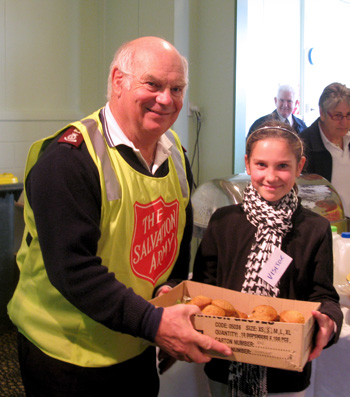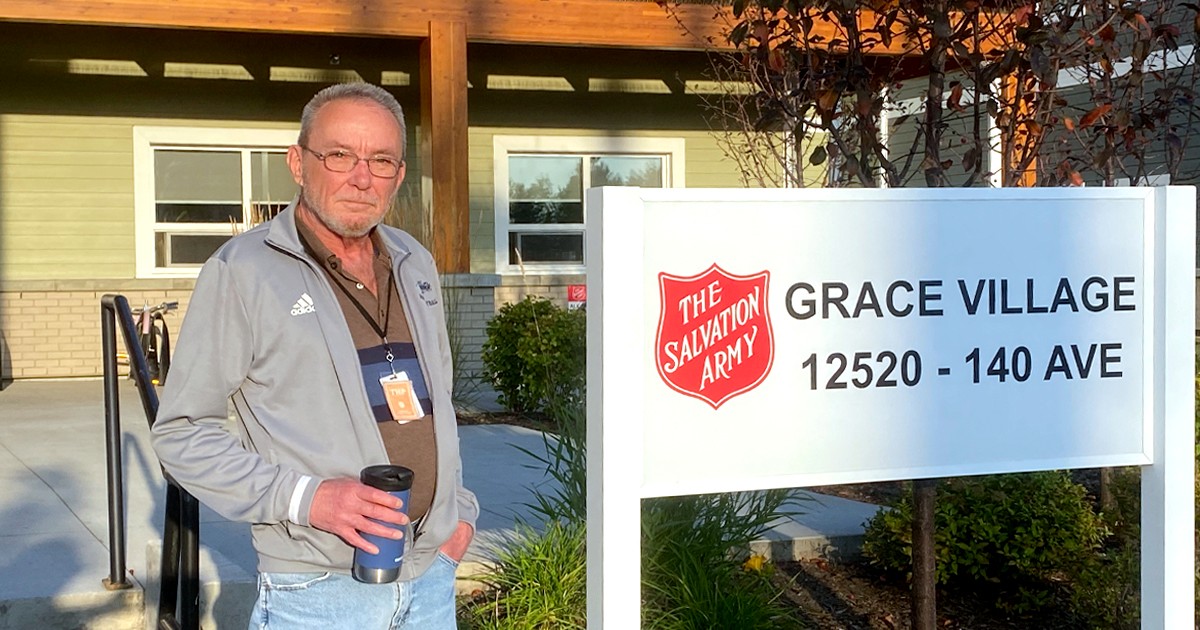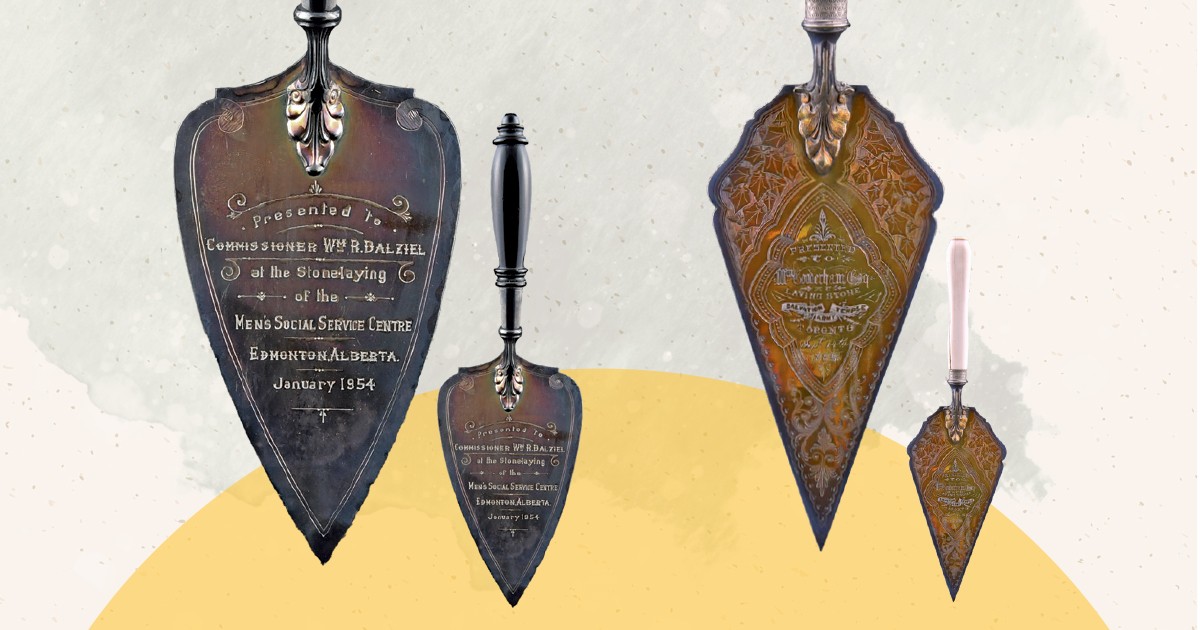The city of Christchurch and surrounding areas close to the quake's epicentre are coming to grips with the devastation to buildings and infrastructure, especially water, as well as a huge repair bill, estimated to be as high as NZ $2 billion.
Within hours of the disaster, The Salvation Army was feeding around 1,000 people at two Christchurch locations. This practical relief effort has now been expanded and people are being fed from three centres – Linwood and Burnside High Schools and the Addington Race Course. Around 100 people have stayed at the sites since the night following the quake. Meals are also being served to a large number of emergency services and welfare support personnel.
During the day, The Salvation Army is feeding people who drop in for food and reassurance but sleep elsewhere. Major Rex Cross, the local Salvation Army emergency services coordinator, speaking from Linwood High School, expressed concern about forecasts of gale force winds and rain. He said that if this eventuated then the number of people presenting at the city's welfare centres is likely to swell. There are fears that poor weather conditions could topple unstable chimneys and other structures and worsen the city's sewerage problems.
'But there is a great community spirit here,' said Major Cross. 'We are extremely grateful for the cooperation between helping agencies and there is a tremendous community response, with food donations coming in from members of the public keen to help.'
Hospitality is a strong feature of life in the New Zealand South Island, said Divisional Commander Major Clive Nicolson. Many locals made homeless by the quake are staying with family and friends. However, The Salvation Army knows that for those without such supports – and for those on low incomes and with more complex social needs – its help will be called upon in the days and weeks to come, particularly for those without insurance cover.
Major Nicholson says, 'For us it's going to hit as we move forward, when people come to us and say, “I haven't got insurance and everything is lost or damaged, can you help me out?” And so we'll be responding to those needs. Already though, our teams have done a tremendous job.'
The earthquake was centred 30 km west of of Christchurch, with damage in the city and outer suburbs, extending to rural centres. There are no reports of fatalities, but there have been some injuries, several serious. Building facades in the central city have collapsed, bridges are affected, cars have been crushed and many homes are damaged. A State of Emergency has been declared that is expected to be in place for several days.
There is significant damage to infrastructure, with power, water and sewerage affected. Drinking water is in short supply, with pipes ruptured. Heating is an issue at night as chimneys have been destroyed and power outages are expected to continue. Health issues are likely to be an ongoing concern.
Immediately following the earthquake, believed to be the largest to hit the country since 1931, The Salvation Army's Territorial Commander for New Zealand, Fiji and Tonga, Commissioner Donald Bell said, 'We're extremely fortunate that this earthquake struck during the night. If this had happened a few hours later, with people and cars on the streets and in businesses, we would have been looking at many injuries and likely loss of life. We are also fortunate that the weather in Christchurch is good, which is making work easier for police and other emergency response workers.
'No matter how prepared a nation is for an earthquake, there is always great fear, anxiety and disruption of life afterwards. Many people have lost possessions and their housing is not secure. We are praying for these people and for those who are helping them cope, including our own people on the ground,' the territorial commander added.
The Salvation Army has launched an appeal to help those most in need after the quake and is receiving strong support from the public and from the corporate sector.
The Salvation Army's New Zealand National Fundraising Coordinator, Major Robbie Ross says, 'The Salvation Army is extremely grateful for the great support it is receiving, from individuals and the corporate sector, recognising that demand for our assistance will remain high during the clean up period to come.'

Two days after a 7.1-magnitude earthquake hit the Canterbury region of New Zealand, The Salvation Army in Christchurch was caring for more than 400 people made homeless by the disaster.
Salvation Army emergency services personnel and volunteers are staffing welfare centres in the Christchurch suburbs of Burnside, Linwood and Addington. Each centre provided around 400 meals yesterday. Rangiora Corps (Salvation Army church) provided accommodation, food and comfort to 50 people overnight in Kaiapoi.
The Salvation Army also supplied food parcels from its centres, including a bulk consignment for members of the Samoan Seventh Day Adventist Church, who were sheltering in their church.
Major Clive Nicolson, commander of The Salvation Army's Southern Division in New Zealand, expects similar demand for welfare services to continue for the foreseeable future. 'Beyond that,' he said, 'there will be an ongoing need for clothing, furniture and food, as well as advocacy for people needing help with Government agencies and other organisations.'
Westpac Bank in New Zealand has committed NZ$1 million to the Westpac Canterbury Care Fund, naming The Salvation Army as its senior partner. The Salvation Army will use some of the money to help those needing food, shelter and care, and put the rest towards those needing longer-term support.
'The Salvation Army is one of the most respected and recognised community care organisations in New Zealand,' said Westpac Chief Executive Officer George Frazis. 'We are thrilled to welcome them as a primary partner with the Westpac Canterbury Care Fund.
'When the state of emergency is lifted, central funding for The Salvation Army stops, but the needs of the people in Christchurch whose lives have been turned upside down will continue for some time.'
Commissioner Don Bell, Territorial Commander of The Salvation Army's New Zealand, Fiji and Tonga Territory, said: 'The Salvation Army welcomes the contribution and partnership of Westpac, which we know is focused on getting the people of Canterbury back on their feet as soon as possible.
'The funds donated by Westpac will give a solid base from which we can meet emerging needs, which we will understand more fully in coming days. The Salvation Army will work with the community to ensure this money makes a real difference to those affected by this weekend's devastating earthquake. It is our privilege and our responsibility to work with the Canterbury community in such difficult circumstances.'
The Bank of New Zealand (BNZ) donated $250,000 to The Salvation Army for immediate use. The public has so far donated $34,000 to The Salvation Army's earthquake appeal.
Several companies are talking to The Salvation Army about providing food and personal care products.
A number of Salvation Army properties were damaged in the quake. One house moved off its foundations, with cracks and broken windows reported in other buildings. The St Albans Corps hall has significant structural damage, with one crack that starts on the hall's asphalt driveway extending through the building.
Access to some areas of Christchurch is still restricted, with structural assessments of Salvation Army properties in the city's central business district not yet completed.









Leave a Comment